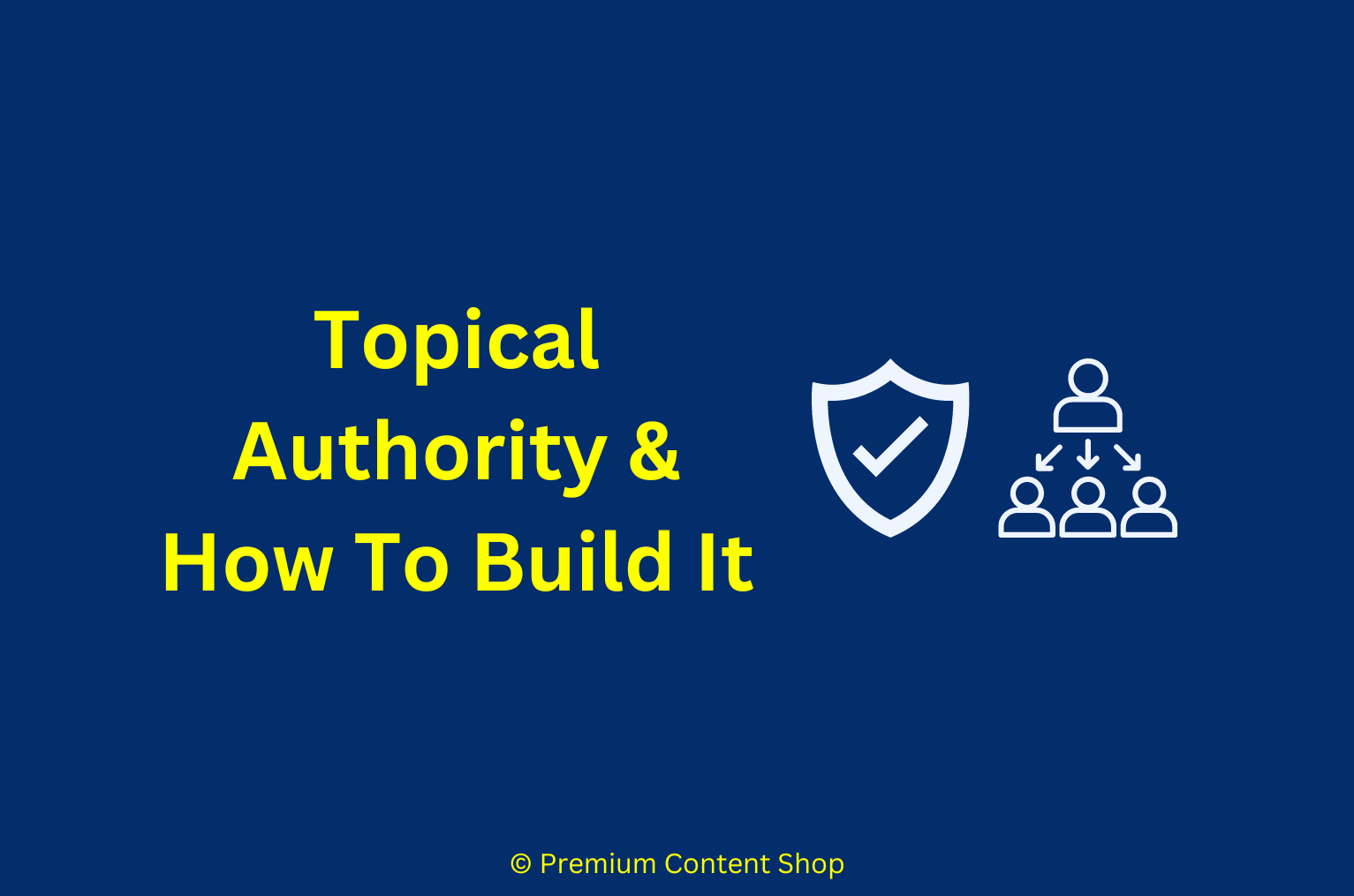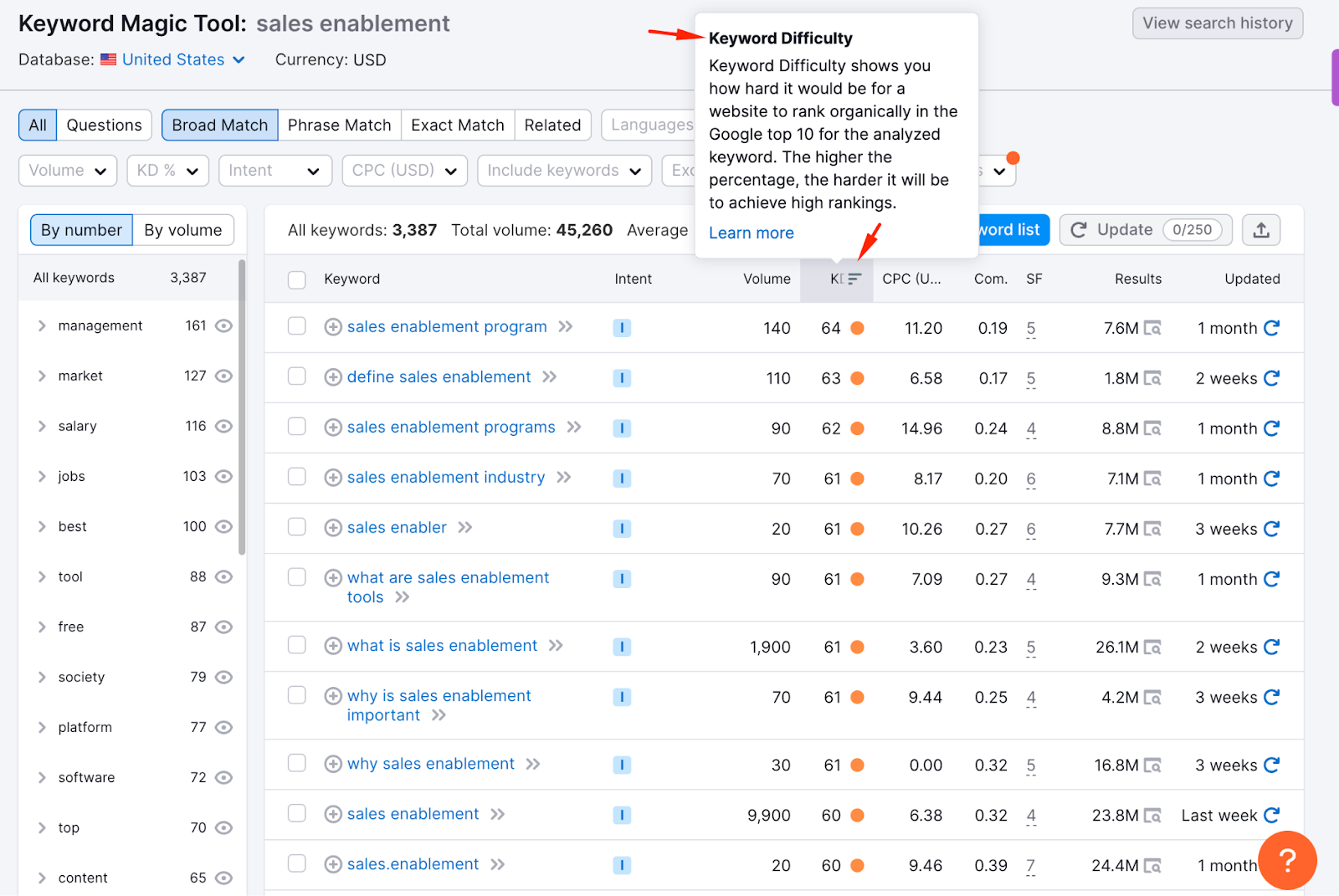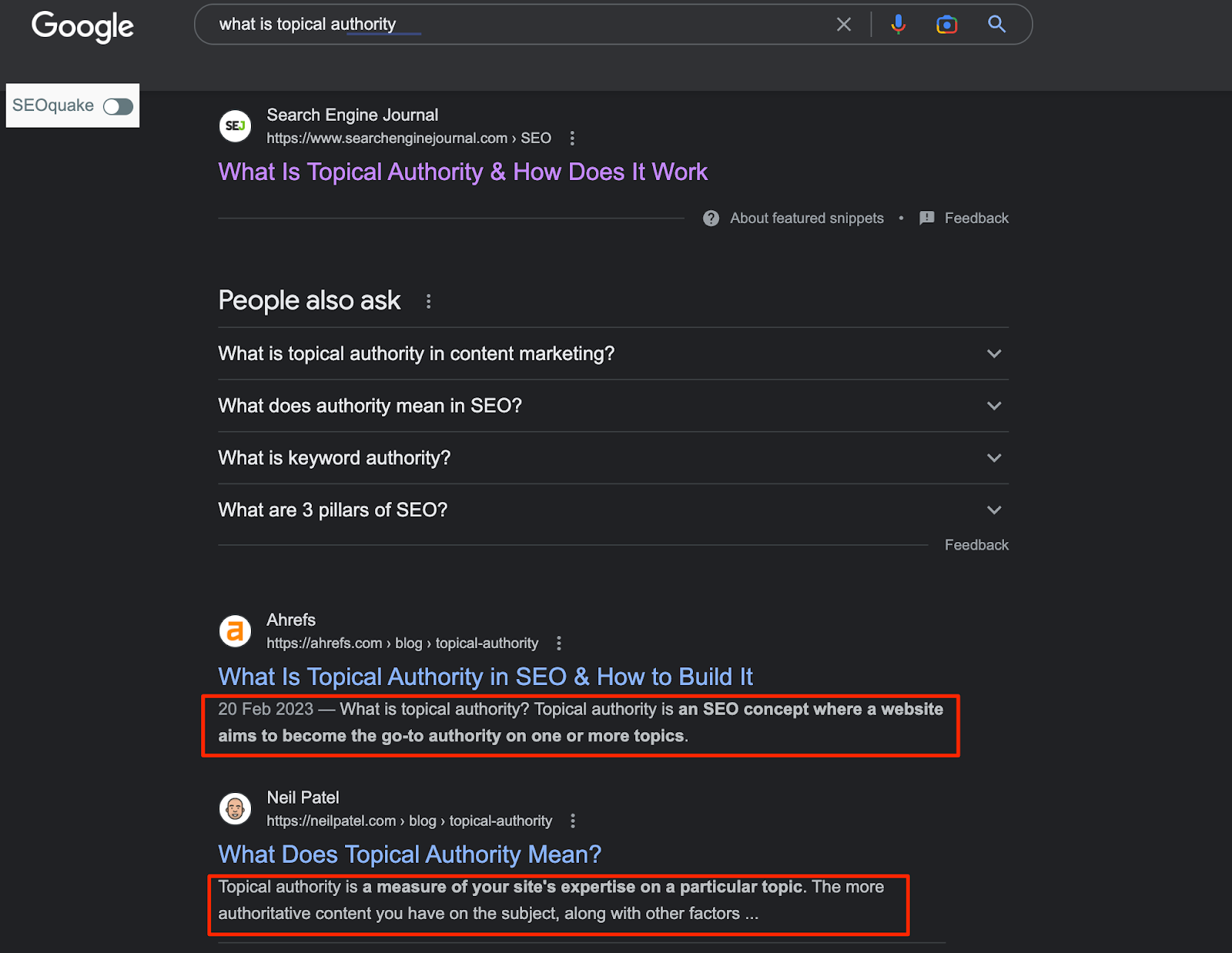
How does it feel when you get recognized for your expertise?
Excited? Fulfilled? Proud? All the feels, right?
If you’re like me and most people I know, getting recognition for your expertise is probably one of the best feelings in the world.
But beyond those feelings, it opens up doors for more opportunities and growth, be it professionally, financially, or even in terms of influence.
This is why topical authority is so important, and why it’s essential to build if you want to be a successful online business using SEO and content marketing.
So what is topical authority?
It’s a measure of how well you know and understand a particular topic. It’s about creating content that is informative, comprehensive, and authoritative within a certain niche or industry, to ultimately show you’re an expert in that field.
The more people know you as an expert in your niche, the better your chances of earning their trust and loyalty, and getting them to do business with you.
But building topical authority takes time and effort. It costs good money, too, if you’re hiring writers and creators to produce your content.
Let’s go into the details of how to build excellent topical authority.
7 steps to building excellent topical authority
Here are seven steps to help you build your own topical authority:
1. Start from a niche
There’s a bit of a difference between a niche and an industry. A niche is a focused subject within an industry. For instance, Sales is an industry, but it has niches like B2B sales, lead generation, and cold calling.
Your #1 goal with building topical authority is to be known as an expert in a particular niche, and further down the line, you can start addressing industry-level topics and build authority there too.
But essentially, your niche should be:
- The area your business operates (or intends to operate) in
- An area you have strong expertise in or are passionate about
A good starting point to find niche-level topics is to simply insert the topic into a keyword research tool like Semrush and start looking at what other topics come up.
For example, if I was trying to build topical authority for a company in the B2B sales niche, I could type ‘B2B Sales’ into Semrush, and here are some of the niche-level keywords that’ll show up:

Focusing on niche-related topics like these provides three main benefits:
First, it allows you to show potential customers you’re an industry leader and expert in your niche.
Second, it helps you show search engines like Google that you’re an authoritative source for content in your industry. This way, they’ll know to show your website in search results when people are looking for related topics.
Third, it gives you clarity on the kind of content you should be creating and what your core messaging should be.
2. Exhaust all topics at the niche level
When executing your content marketing strategy, there’s almost always a temptation to branch out and cover topics at your broader industry level.
For example, if you’re in the personal finance space, you may be tempted to cover economic indicators or financial market trends. But that’ll hardly serve your purpose well.
But again, your #1 purpose is to be known at the niche level and the way to do that is to deeply cover topics at that level.
And this doesn’t mean “never, ever talk about anything related to the broader industry.” It just means, for starters, your focus should be at the niche level — so you can more easily become an authoritative source for your target audience there.
And once you exhaust all topics there, you can graduate to the broader industry level.
So how do you exhaust topics within your niche? One of the best ways is to do in-depth topic research and identify:
- topics customers often bring up during conversations,
- trending niche-related topics on social media, etc.,
… and then plug all those into your keyword research tool.
For instance, if my primary niche is the B2B sales space, I’d probably have noticed conversations often come up around cold emails, sales enablement, lead generation, CRM software, and so on. So I’d plug those topics into my keyword research tool and find more related topics to cover.
If I plug in ‘sales enablement,’ for instance, here’s what the results will look like:

Repeat the same process for all the niche-level topics you find. The main point here is to make sure you identify as many topics as you can in your niche.
This way, you’ll be able to create more content and show potential customers and search engines that you’re an authoritative source within the industry.
3. Pick topics you can rank for
Now this is super important.
It’s easy to find a bunch of keywords and topics, but the trick is to find the ones your website can rank for.
If you’re unfamiliar with what “rank for” means, here’s a quick explanation:
When someone types a query in Google or another search engine, it’ll use its algorithm to look for the best match and display results accordingly. The position of a website’s page in the search engine results page (SERP) is called its “ranking.”
The higher your ranking, the more likely people are to click on your page and stay on it. And several factors affect your ranking — from the quality of your content to how many backlinks you have pointing to your page.
So how do you identify keywords your website can rank for? Look at your keyword difficulty (KD) scores, that’s how.
Most keyword research tools will have a built-in feature that’ll tell you the difficulty score of each keyword. For example, in Semrush, it looks like this:

To arrive at these KD scores, keyword research tools will often consider several ranking factors and assign a score to each keyword.
So if your KD score is below 20, that means the keyword isn’t too hard to rank for. On the other hand, if it’s above 80, then you may have a hard time ranking for that keyword.
So when planning your content marketing strategy, make sure you’re picking topics that your website can rank for.
4. Create in-depth content per topic
There’s such a thing as “content depth” and it’s the key to success with content marketing.
In-depth content will give your audience a thorough or comprehensive understanding of the topic and help them make well-informed decisions.
But that’s not all, it’ll also improve your chances of ranking high in the SERPs since search engines are constantly crawling websites for high-quality and comprehensive content.
They don’t want searchers to click a search result and leave the page after a few seconds, so they prioritize sites that provide more in-depth content.
So how do you create in-depth content? Here are a few tips:
- Search the topic on Google and look at the “People Also Ask” section. This will give you more ideas and topics to cover in the content piece.
- Look at the points your competitors are covering for each topic and think of what they’re missing. Provide extra detail, pictures, and even videos to explain the topic better.
- Look at the “Questions” tab in your keyword research tool for any given topic and see what subtopics you should be covering in your content.
In the end, your goal here should be to create in-depth content that covers the topic from all angles — from the basics to the nitty-gritty details. The better your content is, the better your chances of ranking higher in search engine results.
5. Expand into the industry level
Industry-level topics are often more complex and require a more comprehensive approach.
And this is another reason I almost always advise starting out with niche-level topics; they’re usually the “easy topics” you can start with and then gradually expand your content to cover the more complex, industry-level ones.
But how do you identify or find industry-level topics?
Simply enter your main industry keyword into a keyword research tool and look at the list of related topics.
For example, let’s say you’re selling an SEO software product and you’ve pretty much exhausted all the topics in that niche. You’re now ready to move up to the industry level.
SEO is a niche inside the digital marketing industry, so you can enter “digital marketing” into your keyword research tool and look at the “related topics” and “topic variations” to identify relevant industry-level topics.
At this point, you’ll find so many topics that you can’t possibly cover them all in one go. So you’ll need to prioritize.
Focus on the topics that have the highest potential to bring in organic search traffic. Use your keyword research tool’s KD scores to identify which topics are easier to rank for and focus on those first.
You might also find lots of keywords that aren’t relevant to your business. So make sure to focus on topics that are closely related to your industry or product.
By covering a wide range of topics after you’ve exhausted your niche-level topics, you’ll be able to establish yourself as an industry leader — beyond only being a niche authority.
6. Optimize with other SEO best practices
Building topical authority is a major SEO best practice. But it’s hardly ever effective as a standalone SEO tactic.
That’s why it’s important to ensure that you’re following other best practices like optimizing page titles, meta descriptions, URLs, internal linking, and link building.
Page titles are important because they tell both the search engine crawlers and users what your content is about. They should be concise and include your main targeted keyword.
Meta descriptions are the short blurbs that appear below page titles in search engine results pages (SERPs). Write them to draw users in and compel them to click from the SERP to your web page.

Your URLs should also include the keywords you’re targeting for each page. Don’t stuff them with too many keywords — instead, make sure the URL is concise and readable.
And when it comes to internal linking and link building, you want to make sure you’re consistently adding new links to other relevant content on your site as well as secure high-quality backlinks from other websites.
The more links you have pointing to your content, the higher your pages will rank in search engine results pages (SERPs).
FAQs on topical authority
Just in case you have some unanswered questions, here are some FAQs on topical authority:
What is the difference between topical authority and domain authority?
Topical authority refers to the expertise or experience level of the author of an article or content piece, while domain authority is the overall metric that measures the strength of a website, especially in terms of how many backlinks are pointing to it.
What is a topical map in SEO?
A topical map is a visual representation of the topics or subtopics that are related to a main topic. You can use it to help identify which topics to cover in your content marketing strategy — from niche-level to complex, industry-level topics.
What is topical relevance?
Topical relevance is how closely related a piece of content is to the topic you are trying to target. And it’s important because it helps search engines understand what your content is about and how it should be ranked in search engine results pages (SERPs).
How does semantic SEO affect topical authority?
Semantic SEO is the practice of using search queries, words, and phrases that are closely related to the keywords you’re targeting. When used correctly, it helps your articles rank for multiple keyword variations and longer-tail keywords — thus increasing your topical authority.
How does user intent affect topical authority?
When you are creating content, understanding user intent is essential. Knowing what the user wants to find on your page will help you create content that is both useful and relevant to your topic, as well as optimized for the right keywords.
By understanding the search intent that users have, you can create content that is tailored to their needs and rank for the keywords you want, drive the traffic you need, attract the exact customers you want, and ultimately establish topical authority.
What are pillars and clusters and how do they help with topical authority?
Clusters are groups of related topics that are clustered around a main topic (or a pillar). Pillars are broad topics with many subtopics (or clusters) related to them.
By building pillars and clusters, you can create a network of related content and internal links that are optimized for the right keywords and answers user queries. All of that combined helps you build strong topical authority.
How does site structure affect topical authority?
Your website’s structure is important for topical authority (and SEO in general) because it tells search engines how your content pages are related to one another.
It also helps search engine crawlers understand which pages are most important and should be given higher priority for indexing. And this is key for building topical authority, as it ensures that your content is crawled and indexed by search engines.
What is the purpose of topical authority?
The main purpose of topical authority is to build trust and credibility, and well, establish topical authority as an expert in a particular topic or industry.
It helps you to rank higher in search engine results pages/earn more organic traffic and also to establish your brand as an authority in your field.
What is page authority?
Page authority is an SEO metric that measures the strength of a specific web page on a scale from 0 to 100, with higher scores being more authoritative.
It takes into account factors like backlinks to the page, page content relevance, and other on-page elements to measure how well the page will perform in SERPs.
What is topic-based authoring?
Topic-based authoring is a content development method that involves creating content in small, self-contained units called topics.
Each topic focuses on a single concept or piece of information and can be used on its own or combined with other topics to create larger pieces of content, such as articles, reports, or books.
Ok, let’s wrap up
At the end of the day, topical authority is an important part of your business and SEO and content strategy. At the basic level, it will help you rank higher in SERPs and earn more organic search traffic.
On a more advanced level, you can use it to establish yourself as an industry leader and position your brand as a thought leader in your industry.
Just make sure to play your cards well, stay up to date with the latest SEO trends, and build a strong foundation of high-quality content that is optimized for both users and search engines.
Also remember to focus on topics that are closely related to your industry, starting with niche-level topics and gradually building up to more complex, industry-level topics. Good luck!

